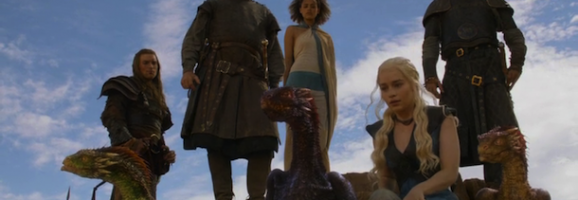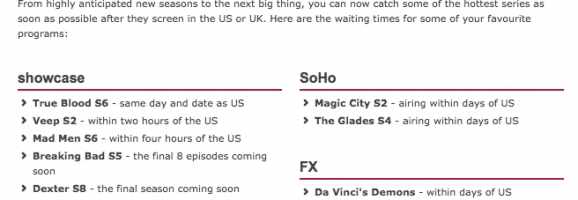Internet Piracy: Why Australia Leads the Pack

This week, my home country Australia once again proved we are the best in the world. No, we didn’t win the America’s Cup, or Wimbledon. As a nation, we torrented the final Game of Thrones episode more than any other nation in the world. I am here to give you an inside look into what makes our great nation the best at intellectual property theft. Despite the tongue-in-cheek headline, I in no way endorse piracy, nor do I pass judgement on those who do. This is simply a window into a few of the reasons for the thriving levels of internet piracy in our country.
This article will use the Game of Thrones finale episode ‘Mhysa’ as an example, the anticipated follow up to the already infamous Red Wedding. TorrentFreak is a website that tracks the behavior of torrent users, and they reported that the torrent for ‘Mhysa’ (a single file) was simultaneously being shared by 171,572 at its peak during the 24 hours after HBO’s original television broadcast. This was a torrenting record, in regard to simultaneously sharing an episode of television. In that same 24-hour period, over a million people downloaded the episode.
TorrentFreak also reported that Australia had the highest number of downloaders per capita, with the U.S, Canada and the U.K following respectively. It would seem that Australians don’t have any qualms about taking what they want. In the past, I often heard the argument from my compatriots, “it’s not available at the same time as the U.S”. Several years ago, this was true. Episodes got to Australia up to a year after they aired in America, like the reels were put aboard a raft and set adrift, with hopes and dreams of when they might arrive. Quite literally, the U.S could be several seasons ahead.
Now however, the networks are starting to catch up. Australian premium cable network Showcase screens Game of Thrones mid afternoon on Mondays, several hours after the U.S, before another screening during prime time on a Monday. This move is obviously designed to satiate the pirates who scream “it’s not available at the same time”. Posters cover bus stops labelled “True Blood: Express from the U.S in 2 hours”, advertising the upcoming premiere. As such, it is now a valid marketing move for Australian networks to let the consumers know just how quickly they are getting their product. Game of Thrones was also available on the Australian iTunes store less than 24 hours after its screening, an unusual move considering it isn’t available on Netflix or Hulu – up until this week. A new deal has been struck with a cable network for exclusive rights to Game of Thrones in Australia, a move that will surely strengthen piracy, as the cost goes from $3.49 per episode (on iTunes), to $73.00 a month for the premium network (a Foxtel subscription with Showcase.)
The problem with this however is when the networks aren’t delivering ‘quick enough’. ‘Express from the U.S’ is a marketing term that is being very liberally applied. Compared to Showcase, Australian cable network FX plays The Walking Dead 33 hours after the U.S, but still bears the ‘Express from the U.S’ tag. Free-to-air network Ten screens Homeland six days after the U.S, but still markets it as express (although it is still a great deal, to get Homeland for free, when it is on a premium network in the U.S.) Sure this is express compared to ye olden days, but is it express in our modern times? I’m not so sure. With series carrying as much cultural buzz, like The Walking Dead and Game of Thrones, anyone who doesn’t watch it within 24 hours is not only behind the times, but also at risk of being ‘spoiled’. I doubt anyone survived the Facebook phenomenon post-Red Wedding, without hearing whose throats got cut. As someone who enjoys following along with critical reviews and online content, time is of the essence. When I watch Homeland six days behind everyone else, I miss out on the opportunity to discuss the show through online forums, or read up-to-date articles, having to self-censor everything I read. Already you can see there are many motivators to pirate the content, considering the delayed availability in Australia.

This image from Foxtel’s website, a major Australian subscription TV provider, explains how quickly programs are ‘Express from the U.S’ for their users.
It would be easy to think that the penniless are the ones torrenting the most. However, a new study by the Australasian Performing Right Association shows that those with a higher education are more likely to illegally download. Whilst 14% of households under an income of $40k downloaded, households with income over $100k was at 30%. They found 25% of downloaders had a university education, and remember, this study was specific to Australia. The likely explanation for this is the higher income households have better technology and internet connections to commit the crime (you can’t rob a bank without a getaway car.) Considering Australia is currently undergoing changes to nationally increase the speed of our internet, the authorities think it is time for action.
Australia is reviewing its policies regarding internet piracy. Currently, there is no copyright policies such as the internet service provider warnings passed on to households illegally downloading that are used in the U.S and France. The government has tried to negotiate trials with ISP’s, however the trial fell apart when the High Court deemed ISP’s were not responsible for the actions of their users.
Stephen Langford, the head of Australia’s Quickflix (similar to Netflix) calls for “studios and tv networks globally to make their content available over our platform and ensure it gets in the hands of consumers legally in a timely fashion and therefore avoid piracy”. I believe this to be true, having surveyed my friends from time-to-time, I think people want to pay; they just haven’t the means to do so. I have one friend who uses a proxy service to gain access to Netflix – he pays monthly for an account because he wants to avoid piracy, yet oddly enough he has to reroute his internet service so he can PAY for content. Where is the logic in that?
The cost and lack of availability are clearly hampering the fight to stop piracy in Australia. The U.S ambassador to Australia quite literally asked our nation to stop pirating Game of Thrones.
“As the Ambassador here in Australia, it was especially troubling to find out that Australian fans were some of the worst offenders with among the highest piracy rates of Game of Thrones in the world. While some people here used to claim that they used pirate sites only because of a delay in getting new episodes here, the show is now available from legitimate sources within hours of its broadcast in the United States.” – Jeffrey Bleitch
This was of course prior to iTunes being cut out of the deal. Now the only option is overpriced, exclusive cable.
The nation is quickly being left behind when it comes to television, and considering that cultural buzz will only heighten the popularity of these series in the future, something needs to be done to find a solution everyone agrees to, otherwise the problem will only get worse. The point of this article was to open an international discussion, about how to move forward together, to find a middle ground before the industry suffers the consequences of not adapting in the modern age.
What do you think? Leave a comment.











I don’t think we’ll ever see a stop to torrenting, there’s too many ways around the system. Here in England, websites like The Pirate Bay and KAT were both blocked but there are so many more available. Maybe it’s down to rising prices for consumers, I don’t know, but I honestly can’t see an end to it.
Great article man!
I do not live in Australia but I did download Game of Thrones. My philosophy if I can call it that is, I will buy the DVD boxset when it is out. Does this mean that I have done a crime by previewing something that I am going to pay for eventually? I personally think not.
Interesting article. I have heard things about Australians downloading the most, but didn’t know too much about it until now.
If HBO offered their online streaming service for a monthly fee without the need for a cable subscription it would have a huge impact. Not sure if you were aware of this, but Quickflix actually has secured the rights to Game of Thrones for streaming, so cable isn’t the only option.
The antiquated business models are a real problem, and it’s up to the company, not the consumer, to update them.
I know Quickflix streams Game of Thrones at present, but the articles I read about Foxtel’s new deal that was struck this week indicated they had exclusive rights, meaning both iTunes and Quickflix were cut out of new content for season 4 onwards, though they would continue to stream the older seasons. But I could be wrong…?
And also, you are completely right about the antiquated business models, HBO needs to move forward. They may lose some money to begin with, but streaming HD quality episodes of Game of Thrones for a smaller cost sounds preferable to me!
It seems you’re right. Bad move on HBO’s part if they were trying to limit piracy.
Great use of reference material too – and well-written. A worthy perspective, one that covers the issues of television, and not just the shows on our screens. Nice article!
Recently in my Media Practices and Studies class at Uni we covered this topic, it is amazing just how much content is being illegally downloaded! Great research done in this article. I think so many people are downloading because the consequences just aren’t high enough. You don’t get in trouble .. Nothing. Something needs to be done though.
I wish I could find the article again that I read whilst researching for this. It cited a study which stated some huge percentage (over 50%) of people in the U.S stopped downloading after receiving warning notices from their ISP. Even if the figures were inflated for propaganda-ish purposes, it’s an interesting thought!
Nice and I’m informed.
I would say to someone “I don’t watch TV” and its technically true. I had advertisements and as a University student I can rarely sit in at the right time each week to watch my show. Therefore, download is my option. I’m not proud, but Television networks are horrible.
This article was posted quite a few years ago, so I think I forgot that Australia was given this title. It surprised me to re-learn that we illegally download more than countries that are more populous.
Interesting read!